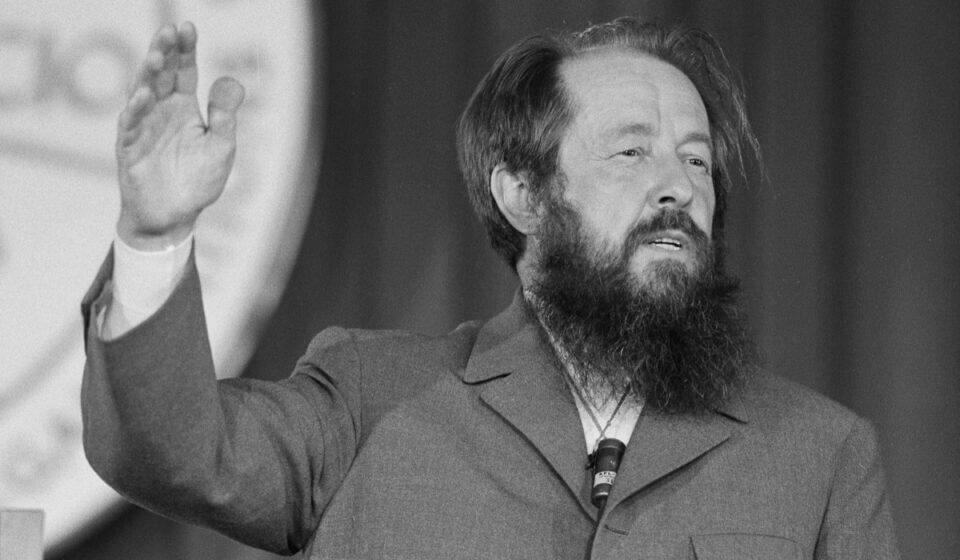
“Solzhenitsyn observed through incredible hardship and deep reflection, that, in his country, the lie had ‘become not just a moral category but a pillar of the state.'”
“But again and again there comes a time in history when a man who dares to say that two and two make four is punished by death…And the question is not one of knowing what punishment or reward attends the making of this calculation. The question is one of knowing whether two and two do make four.” – Albert Camus, The Plague
Being at the heart of our ability to make sense of and find meaning in the world, truth might well be thought of as the very thing we should be constantly seeking and, indeed, reaffirming with utmost ferocity. But alas, our culture has taken quite a contrary position.
The striking amount of conformity that has taken place in recent years—and especially over the last few months—to a rather revolutionary view of people and society (and I use the word revolutionary rather literally) should be nothing short of terrifying to anyone decently read in history and human nature, as well as those concerned with the stability and prosperity of civilization. One by one, institution after institution has succumbed to the demands of reason-decrying, illiberal, anti-enlightenment contemporary “social justice” activists, with the hallmark model for this ever-pervasive occurrence arguably being the affairs of Evergreen State College in 2017. When it was just confined to an esoteric, pseudo-discipline of those committed to identity studies on university campuses, no one raised an eyebrow. However, then the demands of these activists spread to sociology and literature, psychology and history, even to the natural sciences, engineering, and mathematics, both in higher education and in K-12 education. The tide moved from the universities to the corporate world, in the form of new methods of Human Resource management and, now, into popular culture and mainstream consciousness.
All of the sudden, following an undeniably horrific killing of a man by police in Minnesota, every corporation, public entity, and organization announced new commitments to “racial justice” and “equity,” while proclaiming that “Black Lives Matter,” as if they needed to prove they, in fact, believed such a universally unopposed proposition. Old friends and close family members were seen sharing anti-racist guidelines for appropriate methods of “allyship” when they had never posted anything remotely political before. Suddenly, everyone wants to be an anti-racist, but do they really? And do they know exactly what that entails—what it actually means to be anti-racist, according to the clergy of this new secular religion? How much of this newfangled “awareness” of racial issues in the United States (and elsewhere in the West) is born out of genuine curiosity and a desire to know the truth? How much of it is the result of organic, independent thinking on the part of an institution or the individual?
Pitifully little, unfortunately. Indeed, the primary motivator of such developments is anything but genuine; it reeks of conformity and fear. The origin lies somewhere between the popularization of a collective guilt narrative that capitalizes on self-doubt and intimidation tactics and a terrible misunderstanding of what claims are actually being made about the state of the world. Then, there is the issue of the motivations of movements and organizations like Black Lives Matter and what they truly involve.
What these visions lack in reason and genuine wisdom, they make up for in emotional appeal and sentimentality.
To address the latter, Black Lives Matter (the organization, not the phrase) functions as a kind of ideological trap. Its very title is such that any individual questioning—let alone rejecting—any of its aims or claims can be immediately decried as, in fact, not believing that “black lives matter,” that black people’s lives and experiences are valuable. As such, if they do not believe in or support without an ounce of disagreement, “Black Lives Matter,” they must also not believe that “black lives matter.” This is done strategically, of course. It is to make the act of opposing the movement—and, by extension, the organization itself—essentially impossible. And it is not at all exclusive to this particular form of modern activism and mob formation. Opposing any idea or method of Antifa will quickly be spun as opposing opposition to fascism. Therefore, Antifa’s critics are maligned as actively supporting fascism, at least through silence and complicity (which, in turn, can be used to justify violence against said critics of Antifa for being, quite literally, Nazis).
So it is no surprise that so many have taken up the idea of proclaiming their unyielding love and support for these ascendant left-wing movements. They believe they are simply supporting an effort towards equality of treatment for all people. What they may find, however, if they look just a bit deeper is that their definitions of fairness—and, indeed, racism itself—are very different from, say, Black Lives Matter co-founder Patrisse Cullors’ (who has described herself and her colleagues as “trained Marxists” in a 2015 interview) or anti-racism “scholar” and author of How to Be an Antiracist Ibram X. Kendi’s. For Cullors and Kendi, concerns are not limited just to police brutality and criminal justice issues. Instead, their gripes extend to the entire Western ethos. However, the countless people protesting on their behalf seem not to internalize that, making them prime candidates for being described as “useful idiots.”
There is a certain undeniable draw for many towards the utopian ideal, whether it comes in the form of worldwide communism, the modern anti-racism canon, or any number of other glossy exteriors with inevitably demented interiors. What we are faced with today is—in many ways—parallel to these idealized visions of (not so) old. A society free of sin, injustice, inequity, or whatever combination of naive delusions may be employed with little to no consideration of human nature or human history. What these visions lack in reason and genuine wisdom, they make up for in emotional appeal and sentimentality. Indeed the primary philosophical motivator of the communist, the religious zealot, and the anti-racist is not truth or the alignment of morals and facts but, rather, raising a preferred ideal above truth itself.
This is precisely what is seen being played out in the West today, especially in the United States, except in the form of something a bit different. Instead of being primarily concerned with say the abolition of classism and equal distribution of wealth, anti-racism sets its sights on its own god, under the pseudonym of “equity.” Just as the Communists created a lie that all the bourgeoisie (and eventually anyone with any material possession and sustainable success, i.e. the Kulaks) had, they obtained through theft from the proletariat, the critical theorists have concocted a Great Lie of their own. And it is sweeping through the masses as quickly as it did in the revolutionary societies of the not-too-distant past. This narrative is, of course, that everything admirable about the West was derived from exploitation, manipulation, and theft from “people of color” by white people (primarily by white Western European men). In this view, every building, every piece of art and literature, every major political and social document, every system and institution of education, governance and economics, and, indeed, every person found guilty of being born white is steeped in this legacy and worthy of unmerciful deconstruction (or even total annihilation and removal from public thought), as a result. The 1619 Project seeks to establish this doctrine as irrefutable truth, worthy of official adoption in national pedagogy. And this is not only for university students—where it might be said, more or less, already to be the status quo—but also in high schools and even at the elementary level.
The ideology of anti-racism is no less totalitarian, soul-devouring (for both its victims and perpetrators), and indeed murderous (if its assumptions, claims, and prescribed remedies were ever realized) than Bolshevism, Maoism, or Nazism.
Take the ever-growing acceptability and perpetuation of the idea of “white privilege”; it presents a narrative too familiar to those with any real understanding of what happened in the 20th century. It is a modern incarnation of the attempt to apply collective guilt to an entire group of people, to provide a scapegoat to project onto all the ills of society. In Soviet Russia, it was the Kulaks; in Nazi Germany, it was the Jews. Both projects, of course, ended in tremendous loss of life, as well as bringing about the spiritual collapse of entire nations. It is a pattern that oozes resentment and is bound for disaster: “Jewish privilege,” “Kulak privilege,” now “white privilege.”
The “useful idiots,” then, are those who simply take the placards and slogans at face value. They likely have little to no real historical knowledge of similar ideological patterns and methods of subversion and propagandizing. It is the suburban soccer mom with a kind heart or the lifelong liberal-democrat (or libertarian), who, though well-intentioned, does not see where this all leads. When presented with a video like the one depicting the death of George Floyd, he or she puts up a Black Lives Matter sign in the front-yard and begins sharing anti-racist guidelines on Twitter, totally unaware of the anti-human rot at the heart of this ideology.
To quote the late Christopher Hitchens, “Public opinion is often wrong. Mob opinion is almost always wrong. Religious opinion is wrong by definition.” Indeed, as James Lindsay, Helen Pluckorse, Peter Boghossian, and Mike Nayna have all pointed out, anti-racism (and, more broadly “wokeness” and postmodern thought of this ilk) shows incredible homology with religious belief and dogma.
Slogans are a powerful tool, but they are perhaps an even more potent weapon. I would wager the likelihood that there are tens (if not hundreds) of thousands of young people who posted a black square on their Instagram pages one disturbingly Orwellian day this past June alongside a trendy hashtag, while not having the slightest clue about the dangers of mass movements throughout history, where critical thinking was sidelined in favor of expressing devotion to the cause of the day. There has, today, developed a kind of cultural capital for signaling adherence to these forms of activism, for parroting the refrains of the mob. The number of people who have endorsed some aspect of BLM and/or narratives of widespread, systemic racism, white supremacy, and white privilege—without any motivation other than the number of likes they might receive on a social media post or the temporary protection they might hold onto at work or within a social circle—is, by no means, small. And the collective effects of these actions are neither trivial nor isolated. Ignorance and apathy give totalitarians all they need.
Every wrongful confession of guilt made, every lie left unchallenged, every day one remains cowering in fear to the mob is one day closer to hell; or, as Jordan Peterson has more concisely put it, “If you live a pathological life, you pathologize your society. And if enough people do that, it’s hell.” This refers to a place where the sovereign individual is an archaic (and “problematic”) concept, where art goes to die, and where the human soul is boxed-in for nothing more than ultimate utility.
Perhaps no one has proven more adept at articulating the importance of living in accordance with truth than Soviet war veteran, prisoner, and esteemed writer Alexander Solzhenitsyn. Indeed, he is a primary source for Peterson’s views on totalitarian societies, and, now, Peterson’s popular articulations of Solzhenitsyn’s lessons may have reached more people than their original author ever did.
Solzhenitsyn experienced firsthand the hell-on-earth that totalitarianism creates, spending more than eight years in the gulag system (what he called “The Gulag Archipelago” and used as the title for his literary masterwork). Then, in exile, he provided arguably the most timeless and precise critique of such horrific turns a society can take. He sought to understand how people were able to carry out such atrocities as those seen in the Soviet Union, particularly during Stalin’s reign. Men had forgotten God. They had relieved themselves of their commitment to living in accordance with the ideals of God, leaving a hole too large not to be filled. Ideology and the state were—and often are—the perfect fillers. And it is in this way that ideologies can become so unconcerned with truth, what actually is, and what can be safely built upon to provide a stable foundation for people over time.
What becomes of a person who relinquishes his responsibility to think original thoughts and, instead, has a collective hive-mind do his thinking for him?
Solzhenitsyn observed through incredible hardship and deep reflection, that, in his country, the lie had “become not just a moral category but a pillar of the state.” This was enabled by individual cowardice, if not the genuine subversion of the mind and soul, of every person in the society. He described the burden of the catastrophe of human life and flourishing as being on the shoulders of each individual inhabiting the society; every person was partly responsible for the death and suffering. Indeed, Solzhenitsyn once profoundly noted, “The price of cowardice will always be evil; we shall reap courage and victory only when we dare to make sacrifices.” He expands on this idea of sacrifice often being necessary (and even essential) in his 1974 essay “Live Not By Lies,” by addressing those who express fear and hesitation in standing up to the mob and state tyranny, as well as the cost of not doing so:
“And he who is not sufficiently courageous even to defend his soul—don’t let him be proud of his ‘progressive’ views, don’t let him boast that he is an academician or a people’s artist, a merited figure, or a general—let him say to himself: I am in the herd, and a coward. It’s all the same to me as long as I’m fed and warm…A great people of Europe, the Czechoslovaks, whom we betrayed and deceived: Haven’t they shown us how a vulnerable breast can stand up even against tanks if there is a worthy heart within it? You say it will not be easy? But it will be easiest of all possible resources. It will not be an easy choice for a body, but it is the only one for a soul. Not, it is not an easy path. But there are already people, even dozens of them, who over the years have maintained all these points and live by the truth.”
The stakes of conformity with tyranny are not merely material. In practice, they present the most important questions about what it means to be free and to be human. What becomes of a person who relinquishes his responsibility to think original thoughts and, instead, has a collective hive-mind do his thinking for him? What becomes of him when he is incapable of producing art, of creating, of observing beauty?
To go along with the Great Lie is to die a symbolic death of the highest magnitude—what Solzhenitsyn described in The Gulag Archipelago as “the price a man pays for entrusting his God-given soul to human dogma.” Failure to stand for truth is failure to stand for the preciousness of life itself.
To be clear, I am not claiming necessarily that this epoch is unique in its degree of conformity. Rather, this time presents the greatest potential for the most powerful and widespread conformity we have yet to observe, and this already appears to be very much underway. The opposite, though, I believe could become just as true: that we might live in an age when we may be on the cusp of a uniquely individual-respecting and enabling society that still relates properly to the whole. By that token, we must reject both cynicism and nihilism, as Hitchens does when he writes in Letters to a Young Contrarian, “To be in opposition is not to be a nihilist.” One can—and often must—take a stance of resistance, but such resistance must always be undertaken with the spirit of seeking a better alternative.
Things may, very well, get worse before they get better, but no matter how impossible or ridiculous optimism may seem, faith in the ability of man for eternal transformation and moral alignment provides the vigor necessary to illuminate even the darkest of nights. We must remain steadfast in our commitment to truth and reason, to the doctrines of enlightenment-based liberalism and measured individualism, and to the good itself. No opponent to such things has a greater adversary than those willing to defend these ideals with truth on their side. To close, perhaps what may be considered the single most profound articulation from Solzhenitsyn is most apt: “The simple step of the courageous individual is not to take part in the lie. One word of truth shall outweigh the whole world.”.
Jordan Stout is a freelance writer in New Jersey.











Very good article. And what becomes of the “useful idiot” when the mob fully dominates? He accepts the only role left for him – he becomes an informant.
A well written essay, and very thought provoking.Thank God for alternative media. Ive grown sick of the lies from the MSM.